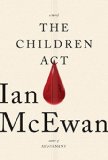Summary | Excerpt | Reading Guide | Reviews | Beyond the Book | Readalikes | Genres & Themes | Author Bio

Yes, by this last essential she herself was failing. The Scotch and water in a tumbler at her side was untouched; the sight of its urinous yellow, its intrusive corky smell, now repelled her. She should be angrier, she should be talking to an old friend—she had several—she should be striding into the bedroom, demanding to know more. But she felt shrunken to a geometrical point of anxious purpose. Her judgment must be ready for printing by tomorrow's deadline, she must work. Her personal life was nothing. Or should have been. Her attention remained divided between the page in her hand and, fifty feet away, the closed bedroom door. She made herself read a long paragraph, one she had been dubious about the moment she had spoken it aloud in court. But no harm in a robust statement of the obvious. Well-being was social. The intricate web of a child's relationships with family and friends was the crucial ingredient. No child an island. Man a social animal, in Aristotle's famous construction. With four hundred words on this theme, she put to sea, with learned references (Adam Smith, John Stuart Mill) filling her sails. The kind of civilized reach every good judgment needs.
And next, well-being was a mutable concept, to be evaluated by the standards of the reasonable man or woman of today. What sufficed a generation ago might now fall short. And again, it was no business of the secular court to decide between religious beliefs or theological differences. All religions were deserving of respect provided they were, in Lord Justice Purchas's phrase, "legally and socially acceptable" and not, in Lord Justice Scarman's darker formulation, "immoral or socially obnoxious."
Courts should be slow to intervene in the interests of the child against the religious principles of the parents. Sometimes they must. But when? In reply, she invoked one of her favorites, wise Lord Justice Munby in the Court of Appeal. "The infinite variety of the human condition precludes arbitrary definition." The admirable Shakespearean touch. Nor custom stale her infinite variety. The words derailed her. She knew the speech of Enobarbus by heart, having played him once as a law student, an all-female affair on a lawn in Lincoln's Inn Fields one sunny midsummer's afternoon. When the burden of bar exams had recently been lifted from her aching back. Around that time, Jack fell in love with her, and not long after, she with him. Their first lovemaking was in a borrowed attic room that roasted under its roof in the afternoon sun. An unopenable porthole window gave a view east of a slice of Thames toward the Pool of London.
She thought of his proposed or actual lover, his statistician, Melanie—she had met her once—a silent young woman with heavy amber beads and a taste for the kind of stilettos that could wreck an old oak floor. Other women cloy/The appetites they feed, but she makes hungry/Where most she satisfies. It could be just like that, a poisonous obsession, an addiction drawing him away from home, bending him out of shape, consuming all they had of past and future, as well as present. Or Melanie belonged, as Fiona herself clearly did, with "other women," the ones who cloy, and he would be back within the fortnight, appetite sated, making plans for the family holiday.
Either way, unbearable.
Unbearable and fascinating. And irrelevant. She forced herself back to her pages, to her summary of the evidence from both parties—efficient and drily sympathetic enough. Next, her account of the court-appointed social worker's report. A plump, well-intentioned young woman often out of breath, uncombed hair, untucked unbuttoned blouse. Chaotic, twice late for the proceedings, due to some complicated trouble with car keys and documents locked in her car and a child to collect from school. But in place of the usual please-both-parties dither, the Cafcass woman's account was sensible, even incisive, and Fiona quoted her with approval. Next?
Excerpted from The Children Act by Ian McEwan. Copyright © 2014 by Ian McEwan. Excerpted by permission of Nan A. Talese, a division of Random House LLC. All rights reserved. No part of this excerpt may be reproduced or reprinted without permission in writing from the publisher.




Nearly all men can stand adversity, but if you want to test a man's character, give him power.
Click Here to find out who said this, as well as discovering other famous literary quotes!
Your guide toexceptional books
BookBrowse seeks out and recommends the best in contemporary fiction and nonfiction—books that not only engage and entertain but also deepen our understanding of ourselves and the world around us.